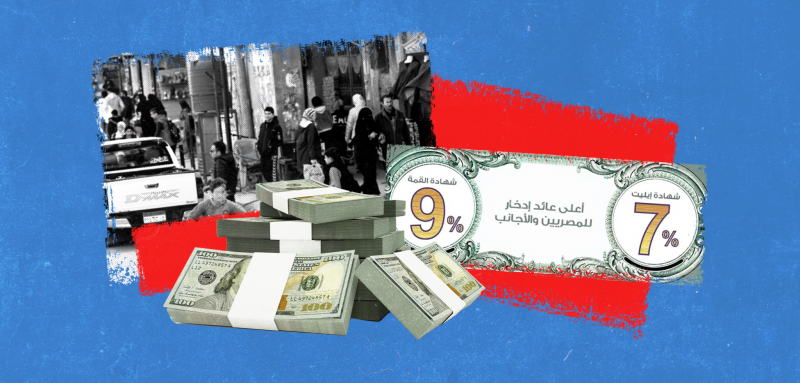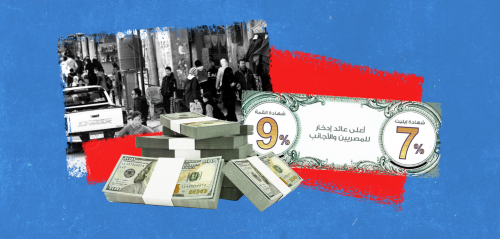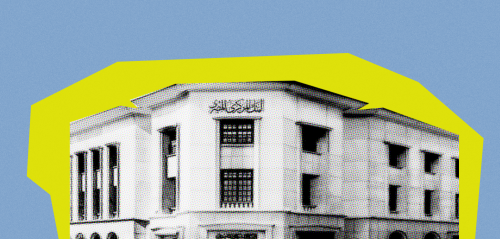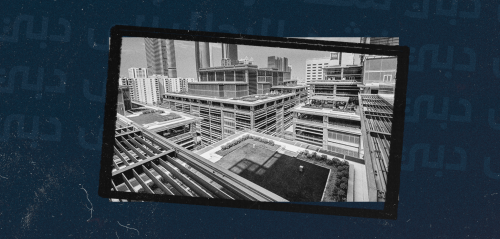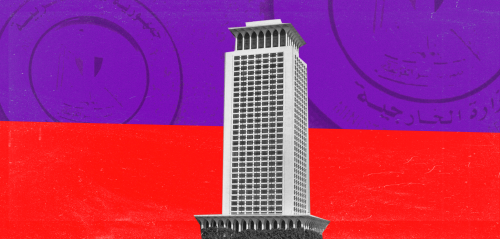"If you have a million dollars in bank notes; visit our bank, buy a certificate of deposit, and no one will ask you about the source of your money."
That's the bold declaration made by Yehia Abou El-Fotouh, vice president of the National Bank of Egypt, during a recent phone interview on the tv program “Ala Massoulity” (On My Responsibility). He announced the launch of two new dollar certificates, "Al-Ahly Plus" and "Al-Ahly Fawran", with the latter offering depositors an immediate return of up to 27%.
Abou Fotouh's statements about depositors not having to disclose the origins of their funds sent shockwaves across social media, raising a huge wave of questions and a range of reactions from skeptics, those who advised caution, and even those who found humor in the situation. Three key questions emerged from this intriguing scenario:
1- Could this decision inadvertently open the floodgates for money laundering gangs? And if so, what would be the far-reaching consequences?
2- With the state seemingly stretched thin, where will it procure the necessary dollars to fulfill the promised benefits and returns on these new dollar certificates?
3- What potential scenarios could unfold if people opt not to invest in these certificates?
In the following report, we attempt to answer these pressing questions.
The backdrop of the newly issued dollar certificates
Egypt finds itself in the throes of a severe economic crisis that simply cannot be ignored or brushed under the rug. The heart of the issue lies in the mounting debts incurred by the government to finance its grandiose development projects. The foreign debt has now reached a staggering $165 billion at the end of the past fiscal year (June 2023).
Furthermore, the existence of a permanent budget deficit (our expenses are more than our revenues) remains a constant challenge. As the Minister of Finance, Mohamed Maait, admitted in a recent televised interview, the only viable recourse appears to be seeking further borrowing – essentially a case of "I will borrow again", as he put it, to meet financial demands.
Adding to the complexity of the situation is the simmering tension between Cairo and Riyadh, Egypt's primary supporter. This strain has cast doubts on the scale of the expected aid from this critical ally.
Tensions between Egypt and Saudi Arabia came to light, with the clear statement made by Saudi Finance Minister, Mohammed al-Jadaan, during the Davos Economic Forum last January. He declared, "We have changed the way we provide grants and aid without conditions; now we want to see reforms."
The underlying message suggests that: Gulf countries will no longer "assist" Egypt but will instead strategically "purchase" what they deem as profitable assets.
Amidst these complexities, remittances from Egyptians working abroad – one of the main sources of foreign income for the country – have seen a significant decline. Data from the Central Bank of Egypt reveals that remittances dropped from $23.6 billion during the first nine months of the previous year to $17.5 billion in the same period this year.
This decline is due to the fact that Gulf workers, instead of transferring money through banks, now prefer handing it over to traders there, who then provide the equivalent amount in Egyptian pounds to their families back home. Consequently, the national economy loses those dollars that never find their way into the country.
Importantly, this choice made by expatriates is not driven by a lack of patriotism or disdain for the government. It is purely based on the fact that the exchange rate of foreign currency with traders there is much more favorable than the rates offered by Egyptian banks.
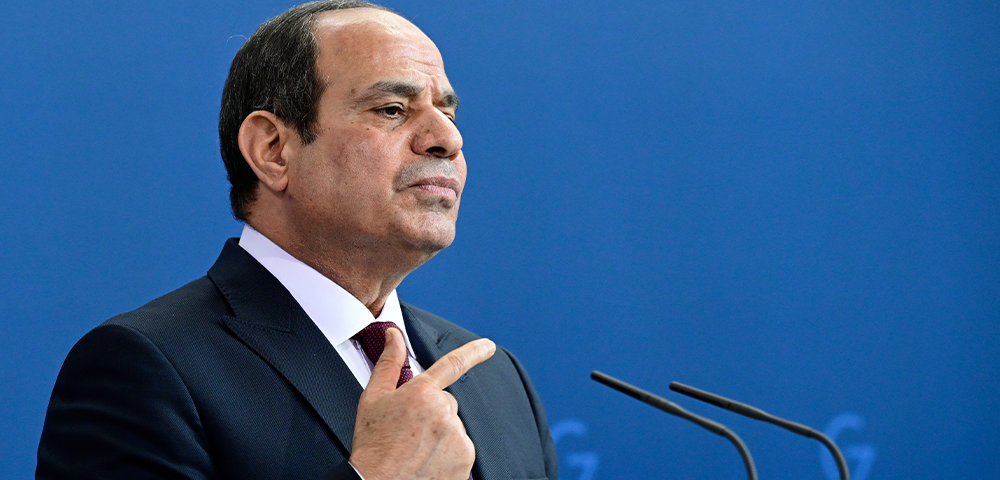 Egyptian president Abdel Fattah El-Sisi
Egyptian president Abdel Fattah El-Sisi
Sisi's statements and messages
The economic situation has become so complicated that President Abdel Fattah El-Sisi issued two significant statements. Firstly, during the New Global Finance Pact summit in Paris, he urged international finance institutions to "understand" Egypt's situation and economic pressures, while calling for "reforming the global financial structure" to bolster financing fro development in developing countries.
The second statement, conveyed that Egypt's exchange rate is now a matter of "national security", and his government cannot approach it if it negatively impacts the lives of Egyptians. This was a clear message, although unnamed, directed at the International Monetary Fund, signifying that Egypt will not float the pound again.
Details of the new dollar certificates
The issuance of the new dollar certificates was not exclusive to the National Bank of Egypt; Banque Misr released two similar certificates.
In essence, both certificates are comparable, with only minor differences in their names and terms.
The National Bank of Egypt introduced the "Al-Ahly Plus" certificate, with a 3-year duration and an annual yield of 7%, paid in dollars every 3 months. Borrowers are allowed to leverage them up to 50% of the value in Egyptian pounds.
They also launched the "Al-Ahly Fawran" certificate, also with a 3-year duration, offering an annual yield of 9% paid upfront in Egyptian pounds for the entire period, but it cannot be used as collateral for loans.
Meanwhile, Banque Misr issued two certificates under the names "Elite Certificate" and "Al-Qimma Certificate," both offering almost the same terms.
Will Egypt facilitate laundering suspicious money?
New dollar certificates and money laundering
As soon as the National Bank of Egypt announced the issuance of the new dollar certificates, a wave of warning cries swept through social media from all directions. Concerns were raised about the official statement of the bank's vice president regarding "not asking about the source of funds", cautioning against dire consequences from facilitating money laundering.
What are these severe consequences that some are talking about?
There is an international organization called FATF (Financial Action Task Force) whose mission is to assess the commitment of financial institutions to comply with anti-money laundering and counter-terrorism financing standards. According to widely recognized criteria, violating countries are either placed on the gray or blacklists.
Being placed on the blacklist makes it difficult for the country to conduct any external dollar transactions and prohibits dealings with local banks and financial institutions. Moreover, such a designation increases the country's risk rating and classifies it as a high-risk economy (lowering its credit rating and that of its banks to a minimum), thereby raising borrowing costs and deterring potential investors.
So, are we truly on the verge of such a predicament, or is the hype on social media just hype?
Economic expert Medhat Nafei provides an answer: "Let's agree initially that we are facing a forced and urgent decision. The country needs dollars, and this may be an appropriate means to manage it. Technically, this decision may not be ideal, but as mentioned, it is an imposed one."
Regarding the legal aspect – and the discussion is still ongoing – it is not feasible for the Central Bank of Egypt to issue a decision while being aware that it contradicts international agreements. Such an action is highly unlikely. Any new products introduced by banks operating within Egypt, particularly if they involve foreign currencies, necessitate approval from the Central Bank of Egypt.
Therefore, Nafei believes that the highest financial and banking authority, represented by the Central Bank, will implement alternative mechanisms to circumvent this issue. Ultimately, "inquiring about the source of funds is one way to regulate the process, but there are other means that banks will resort to in order to secure themselves from getting entangled in this predicament."
In this context, resorting to these certificates to extract dollars from the black market and channel them into the formal economy seems justified, as the country is in dire need of approximately 8 billion dollars in the near future. However, I have doubts about whether these new dollar certificates will successfully manage to secure this amount.
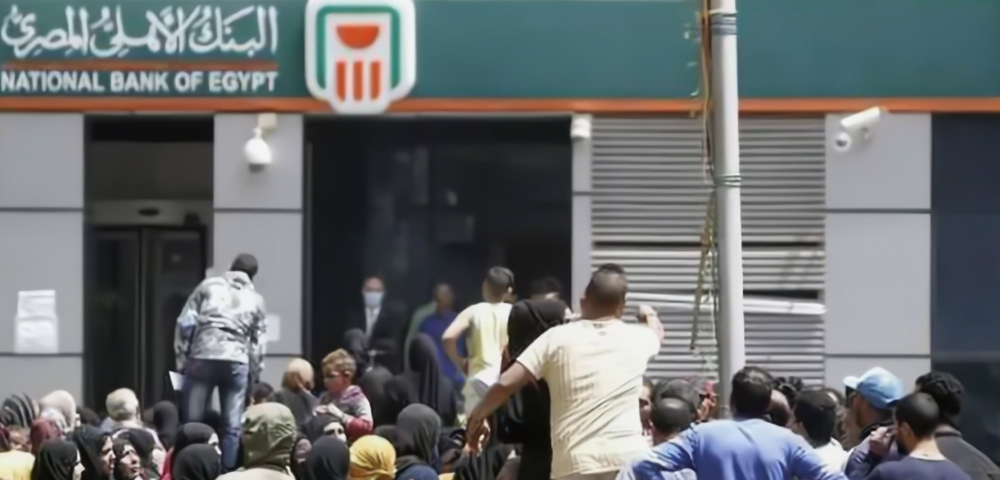 People queued outside the Central Bank of Egypt
People queued outside the Central Bank of Egypt
How will banks manage dollar interest?
The dollars deposited by Egyptians into the new dollar certificates are not gifts or donations; they are investment certificates, with investors expecting a return of up to 9% in dollars. So, how will banks manage this inflow?
Raseef22 met with a bank manager (requesting anonymity) to answer this question, and he says, "The banks will not keep these dollar bank notes; instead, they will re-invest them in the form of one-day deposits (on Fridays and Saturdays) in an international commercial bank, or they may tie them to short-term treasury bonds, to generate a margin that enables them to pay interest to depositors."
He continues, "The government is well aware that the volume of dollars outside the formal economy in the country is more than 20 times what is inside the banks. Given that foreign cash reserves are less than 35 billion dollars (about a third of which are Gulf deposits) – and this is a small figure for a country the size of Egypt – there is no alternative but to seek to collect dollars from within. This is why the dollar certificates were introduced."
The bank manager concludes, "What I see is that we are facing a temporary measure that will be followed by a devaluation of the pound, and I expect it to reach 30% – from its current value – to compensate for high-interest rates. The gain here (if depositors show interest in these dollar certificates) lies in the state's success in managing the dollars it needs in the short term, as well as withdrawing as much money as possible from the informal economy."
How will Egypt utilise the dollars it attracts to alleviate the current economic crisis?
The chances of success
In theory, the offer seems promising: instead of hoarding your dollars under the floor slab ", deposit them in the bank and reap attractive returns. But will Egyptians embrace this proposal?
Dollar holders can be divided into two categories: investors dealing with substantial amounts of dollars, while the second consists of individuals with relatively small amounts.
Businessman Hesham Ouf shared his perspective with Raseef22, describing what is currently taking place in the market, "There is a state of genuine anger among businessmen who view the current situation as absurd. How can the state prevent importers from procuring the dollars necessary for business operations and force them to obtain funds from banks? This hinders their capital cycle, as the process of going through the banks has become a difficult process. Meanwhile, the state open up to funds of unknown origin if they are directed towards purchasing dollar certificates!"
As to individuals with smaller amounts, it is sensible for the state to target them with these dollar certificates. However, predicting the overall response of depositors to this offer is a challenge. There is widespread fear, evident on social media, that depositors might entrust their dollars to banks only to face a new decision preventing them from withdrawing those funds.
Nevertheless, banker Nohad Jad believes that making such a decision would be incredibly difficult due to potential "catastrophic consequences". One of the major implications would be the withdrawal of major foreign companies from the Egyptian market, since their presence would lose significance if they couldn't withdraw funds from the banking system.
Amidst a severe economic crisis and violent regional fluctuations, Egypt stands on a tightrope, and no one can predict whether the new dollar certificates will act as a stimulus or booster to the system.
However, it's certain that the real salvation from this crisis can only be achieved by maximizing Egypt's dollar resources through exports or attracting genuine foreign investments. This requires significant changes, both in the legislative framework and the economic plan of the state... Can such changes occur?
Raseef22 is a not for profit entity. Our focus is on quality journalism. Every contribution to the NasRaseef membership goes directly towards journalism production. We stand independent, not accepting corporate sponsorships, sponsored content or political funding.
Support our mission to keep Raseef22 available to all readers by clicking here!
Interested in writing with us? Check our pitch process here!
